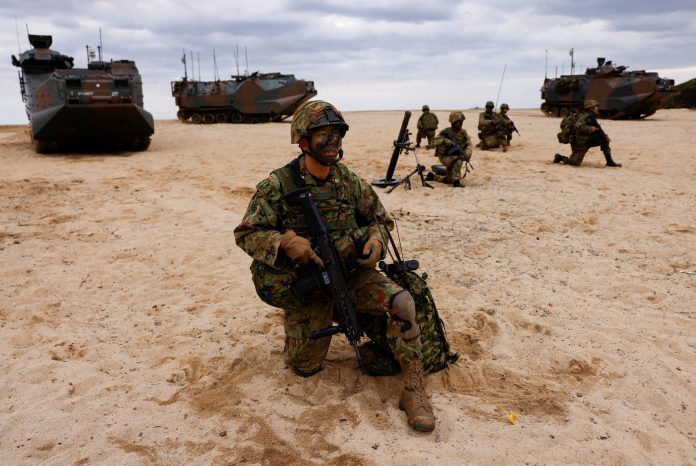Japan released a series of key strategic documents In December 2022- the National Security Strategy (NSS), the National Defence Strategy (NDS), and the Defence Capacity Building Programme (DCBP) – that signify significant changes in Japan’s defence posture in response to the complex and austere security environment in the Indo-Pacific region, European Leadership Network reports.
The documents note security challenges from North Korea and Russia, but China is seen as Japan’s most serious strategic challenge in the Indo-Pacific because of its military activities and economic coercion.
According to recent public polls, nearly 80% of Japanese are concerned about the possibility of a Taiwan situation. However, only 22% support the deployment of the Self-Defence Force to fight alongside US troops in such an event. Meanwhile, 44% support the idea of not deploying the Self-Defence Forces except to provide logistical support, including weapons and ammunition for US troops, while 51% oppose it.
In addition, support for the idea of allowing U.S. troops to use Japanese U.S. bases without the SDF was 48%, while 47% disapproved. As for the view that Japan should not be militarily involved, including allowing US troops to use its bases in Japan, 47% of respondents agreed and 49% disagreed, according to European Leadership Network.
The risk of China using force against Taiwan, which is influenced by domestic economic and political conditions, requires careful consideration. First, if China experiences a serious downturn in its economy that leads to widespread popular discontent, that discontent could be redirected at the ruling Communist government. The leadership might then be tempted to use an aggressive foreign policy, such as the use of force against Taiwan, as a means of mobilising nationalist support and diverting attention from domestic problems.
Second, President Xi Jinping’s personal commitment to unifying Taiwan with the mainland may play a crucial role. Xi’s desire to unify Taiwan is not only a matter of national politics but also an important element of his political legacy. Achieving unification could increase his legitimacy and charisma as a leader, especially against the backdrop of other domestic issues.
Thus, Xi’s resolve on this issue may significantly increase the likelihood that China will resort to force as a means of achieving its goals with respect to Taiwan. This approach should be understood as part of a broader strategy in which domestic imperatives are intertwined with international ambitions, reflecting the complex dynamics at work within China’s political leadership.
Under the leadership of Shinzo Abe, Japan has adopted a proactive approach to dealing with China, emphasising both diplomatic and defence policies. Collective self-defence and the Free and Open Indo-Pacific (FOIP) strategy played a crucial role in this strategy.
In the post-Abe era, Japan, led by Prime Minister Fumio Kishida, has sought to strengthen its defence capabilities in response to a tighter security environment. Japan’s primary focus is on strengthening counter-strike capabilities to deter potential offensive military operations by China as well as threats from North Korea, European Leadership Network reports.
The Japan-US alliance remains a cornerstone of Japan’s security policy, especially in dealing with the potential Taiwan issue. Deterrence is particularly challenging given the evolving nature of China’s military activities.
Japan is increasingly wary of China’s military build-up and aggressive actions, with nearly 80% of the Japanese public expressing concern about a potential crisis involving Taiwan. However, support for the deployment of Japan’s self-defence forces in such a scenario remains relatively low.
To address these concerns, Japan is developing long-range strike capabilities, including the introduction of Tomahawk missiles and the deployment of anti-missile systems. The Japan-US alliance is actively working to coordinate operational plans and conducting exercises to improve preparedness and deterrence in response to the deteriorating security environment, especially in the Taiwan Strait.
These joint efforts underscore the critical need to maintain peace and stability in the region and to deter any attempt to change the status quo through military means. The Kishida administration has also expressed its willingness to strengthen engagement with like-minded countries in the Indo-Pacific region, guided by the FOIP concept.
Taking into account the lack of transparency regarding the military build-up trends and political intentions of China and North Korea, Japan should strive to build a deterrence architecture and establish a network of regional security cooperation to prevent the escalation of the crisis, while seeking dialogue with China and North Korea, if possible, regarding the strategic interests of both sides, promoting mutual understanding as a protective rail for crisis management and creating a threat reduction trend.
